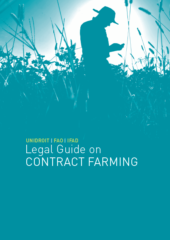
Contract farming, broadly understood as agricultural production and marketing carried out under a previous agreement between producers and their buyers, supports the production of a wide range of agricultural commodities and its use is growing in many countries. Contract farming helps increase agricultural productivity, improve the livelihoods of the rural poor and may play a role in preventing rural exodus. These and other potential economic and social benefits explain the interest of domestic policymakers and international organizations in promoting sustainable contract farming models as part of their efforts to achieve food security.
The Guide is the product of a Working Group set up by UNIDROIT, which brought together legal scholars, partner multilateral organisations and representatives from the farming community and agribusiness. Stakeholder representatives, international civil servants, practising lawyers and academics from different backgrounds contributed to the process of development of the Guide, and valuable input was received during consultations held during 2014 with stakeholders in Buenos Aires, Addis Ababa, Roma and Bangkok, as well as through online consultations.
The UNIDROIT/FAO/IFAD Legal Guide on Contract Farming is aligned with the Principles for Responsible Investments in Agriculture and Food Systems (CFS-RAI Principles) approved in October 2014 by the Committee on World Food Security. The Guide also shares with the CFS-RAI Principles the goal of providing a framework that stakeholders can use when developing domestic policies, regulatory frameworks, corporate social responsibility iv Foreword programmes, individual agreements and contracts, all of which in responsible and inclusive ways.
